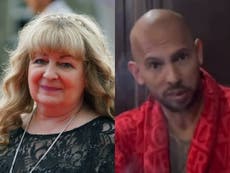‘I needed to get out’: Robbie Williams reveals his reasons behind Take That departure
Williams’ departure from the band caused much fan and media uproar in the mid-Nineties
Your support helps us to tell the story
From reproductive rights to climate change to Big Tech, The Independent is on the ground when the story is developing. Whether it's investigating the financials of Elon Musk's pro-Trump PAC or producing our latest documentary, 'The A Word', which shines a light on the American women fighting for reproductive rights, we know how important it is to parse out the facts from the messaging.
At such a critical moment in US history, we need reporters on the ground. Your donation allows us to keep sending journalists to speak to both sides of the story.
The Independent is trusted by Americans across the entire political spectrum. And unlike many other quality news outlets, we choose not to lock Americans out of our reporting and analysis with paywalls. We believe quality journalism should be available to everyone, paid for by those who can afford it.
Your support makes all the difference.Robbie Williams has opened up about his decision to leave Take That, calling the situation at the time a “burning building” from which he had to escape.
The singer first made his name as one-fifth of the Nineties boyband, alongside Gary Barlow, Mark Owen, Howard Donald, and Jason Orange.
After joining the band at age 16 in 1990, Williams quickly became a fan favourite and provided lead vocals for some of Take That’s earliest hits, including “Could It Be Magic?” (1992).
He left the band in July 1995, a decision which sparked much media attention and fan upset. Take That disbanded in February 1996, before reuniting as a quartet, without Williams, in 2005. Williams, meanwhile, went on to become a successful solo artist.
A new programme for BBC Sounds, titled Robbie Williams: My Life Thru a Lens, sees the recording artist taking a retrospective look at his career on the 25th anniversary of his first solo album.
In it, the “Let Me Entertain You” singer gives some deeper insight into the events that led to him to leave the band.
“I think that I was in the middle of a nervous breakdown, my first of many,” he explains to DJ Scott Mills.
“All the information going into the computer had made the computer overload. Things weren’t great at home, things weren’t great with my job, and then I was new to this phenomena of extreme fame.
“[I was] doing my GCSEs, which I failed at, to then all of a sudden being in Japan and having 3,000 fans outside and then that being the case everywhere that we go. It was unsafe and it was surreal and that, mixed with what I was ingesting to cope with my life and the way that my body and mind reacts to it, didn’t mix well.”
Enjoy unlimited access to 100 million ad-free songs and podcasts with Amazon Music
Sign up now for a 4 month free trial (3 months for non-Prime members)
Enjoy unlimited access to 100 million ad-free songs and podcasts with Amazon Music
Sign up now for a 4 month free trial (3 months for non-Prime members)

During his time in the band, Williams began abusing drugs and alcohol. He has previously stated that he’d been “days away” from dying on several occasions as a result of his addiction.
He continued: “So it felt like I was in some sort of burning building and I needed to get out. That’s how it felt at the time. And then I was like, ‘okay, I’ll do this tour and then I’ll leave.’ And they actually went, ‘Actually, if you’re going to leave, can you go now?’”
Williams is 20 years sober in 2022.
Robbie Williams: My Life Thru a Lens is available now on BBC Sounds and is on BBC Radio 2 on Sunday 1 January, 5-7pm.
If you or someone you know is suffering from alcohol addiction, you can confidentially call the national alcohol helpline Drinkline on 0300 123 1110 or visit the NHS website here for information about the programmes available to you.
If you or someone you know is suffering from drug addiction, you can seek confidential help and support 24-7 from Frank, by calling 0300 123 6600, texting 82111, sending an email or visiting their website here.
In the US, the Substance Abuse and Mental Health Services Administration can be reached at 1-800-662-HELP.




Join our commenting forum
Join thought-provoking conversations, follow other Independent readers and see their replies
Comments